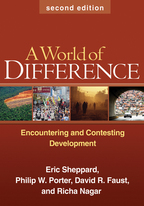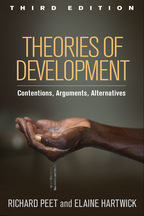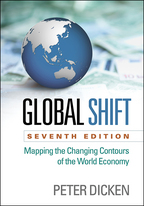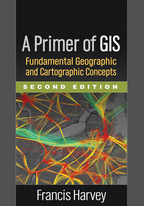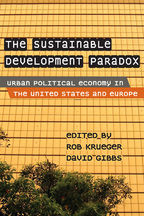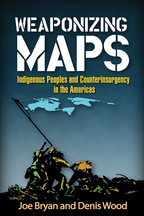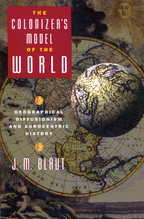A World of Difference
Second Edition
Encountering and Contesting Development
Eric Sheppard, Philip W. Porter, David R. Faust, and Richa Nagar
Paperbacke-bookprint + e-book
Paperback
orderAugust 8, 2009
ISBN 9781606232620
Price: $97.00665 Pages
Size: 7" x 10"
“A 600-plus-page epic tour-de-force of geographical and historical analysis of development discourse and data. Drawing on Marxist, feminist, and postmodern critiques of history, power, and knowledge, it takes the reader on a historical world tour of development ideas and concepts and keeps her questioning fundamental disciplinary assumptions right across the social sciences throughout....There is a wealth of information within the pages of this second edition, with over 50 sidebars, many of which go over numerous pages, more than 100 graphs and figures, a further 50 plus tables and maps, as well as many photographs and substantial quotes supporting the arguments throughout....Much of this data and information have been updated, which is invaluable to placing the arguments presented in the text within the recent context, and is a huge credit to the authors and publishers of the book.”

—The Canadian Geographer
“A valuable work that historically traces how the unequal development of the world has been produced and accelerated by Western powers since the colonial era....With a new edition, one usually expects at most an update with new information and the addition of one or two new chapters. However, this book by far exceeds such an expectation....This intellectual work is highly important to fostering critical awareness of the world. The authors provide abundant concrete examples and explain complex theoretical points in simpler terms....This book is crucial to diagnosing the ills of our world of difference in terms of how the Third World has been reduced to a marginalized position and how the Western development model has been spread, enforced, and maintained as a monolithic template. This is the book's enduring value for radical geographers. A World of Difference allows us a means to teach critical insights about neoliberal globalization and developmentalism to our students, some of whom may dream of going to work for international organizations like the World Bank to help the Third World.”

—Human Geography
“This book is the second edition of an impressive organized collection of topics on development and globalization....This second edition expands the focus of analysis by adding two contributing authors, who provide other theoretical perspectives (feminist and postcolonial analyses) to the initial use of political economy. Hopefully this accessible and valuable book will inspire students to get firsthand experiences on development and the consequences of globalization in cities and villages of Asia, Africa, and Latin America and critically reflect on the consequences of development and globalization.”

—European Planning Studies
“A magnificent achievement! A richly detailed yet highly accessible text for courses on globalization and development. The second edition synthesizes diverse perspectives on the inequalities that characterize the contemporary world, clearly laying out how approaches such as postcolonialism and political economy can help us understand global differences. The authors are to be congratulated for crafting a text that does not shy away from the immense complexities of the natural and social world, but presents them in ways that invite reflection. The examples, case studies, and striking graphics and photographs will help students connect global patterns and processes with local lives, including their own.”

—Susan M. Roberts, Department of Geography, University of Kentucky
“The first edition of A World of Difference was a uniquely valuable volume that used the leitmotif of difference to present a comprehensive picture of the world's physical and social systems. In the second edition, this approach is given an added dimension by pairing the focus on difference with a focus on knowledge. The authors artfully weave these two themes together, providing readers with a profound understanding of the world in which they live.”

—Philip E. Steinberg, Department of Geography, Florida State University
“A textbook of impressive scope. The authors bring to the fore the perspectives of those inhabiting subject positions, spaces, and scales that have historically been excluded. Richly illustrated, the book introduces students to the complexity of our world and examines the multiple, intersecting forces that shape lives, livelihoods, and possibilities for change. Ultimately, the text offers a hopeful analysis that takes careful account of how globalization and resistance are always worked out in specific contexts, rather than being dictated from on high.”

—Victoria A. Lawson, Department of Geography, University of Washington
“This book is an invaluable resource not only for geographers, but for all who are interested in development and social change. Coverage ranges from colonial projects to corporate globalization, from local resource use to the politics of transnational investment, from theories of development to the social outcomes of actual development processes. Unlike those who claim that the world of globalization is 'flat,' Sheppard, Porter, Faust, and Nagar illuminate the historical and contemporary interconnections that make for a highly variegated and uneven global topography.”

—Jim Glassman, Department of Geography, University of British Columbia, Canada
—The Canadian Geographer
“A valuable work that historically traces how the unequal development of the world has been produced and accelerated by Western powers since the colonial era....With a new edition, one usually expects at most an update with new information and the addition of one or two new chapters. However, this book by far exceeds such an expectation....This intellectual work is highly important to fostering critical awareness of the world. The authors provide abundant concrete examples and explain complex theoretical points in simpler terms....This book is crucial to diagnosing the ills of our world of difference in terms of how the Third World has been reduced to a marginalized position and how the Western development model has been spread, enforced, and maintained as a monolithic template. This is the book's enduring value for radical geographers. A World of Difference allows us a means to teach critical insights about neoliberal globalization and developmentalism to our students, some of whom may dream of going to work for international organizations like the World Bank to help the Third World.”
—Human Geography
“This book is the second edition of an impressive organized collection of topics on development and globalization....This second edition expands the focus of analysis by adding two contributing authors, who provide other theoretical perspectives (feminist and postcolonial analyses) to the initial use of political economy. Hopefully this accessible and valuable book will inspire students to get firsthand experiences on development and the consequences of globalization in cities and villages of Asia, Africa, and Latin America and critically reflect on the consequences of development and globalization.”
—European Planning Studies
“A magnificent achievement! A richly detailed yet highly accessible text for courses on globalization and development. The second edition synthesizes diverse perspectives on the inequalities that characterize the contemporary world, clearly laying out how approaches such as postcolonialism and political economy can help us understand global differences. The authors are to be congratulated for crafting a text that does not shy away from the immense complexities of the natural and social world, but presents them in ways that invite reflection. The examples, case studies, and striking graphics and photographs will help students connect global patterns and processes with local lives, including their own.”
—Susan M. Roberts, Department of Geography, University of Kentucky
“The first edition of A World of Difference was a uniquely valuable volume that used the leitmotif of difference to present a comprehensive picture of the world's physical and social systems. In the second edition, this approach is given an added dimension by pairing the focus on difference with a focus on knowledge. The authors artfully weave these two themes together, providing readers with a profound understanding of the world in which they live.”
—Philip E. Steinberg, Department of Geography, Florida State University
“A textbook of impressive scope. The authors bring to the fore the perspectives of those inhabiting subject positions, spaces, and scales that have historically been excluded. Richly illustrated, the book introduces students to the complexity of our world and examines the multiple, intersecting forces that shape lives, livelihoods, and possibilities for change. Ultimately, the text offers a hopeful analysis that takes careful account of how globalization and resistance are always worked out in specific contexts, rather than being dictated from on high.”
—Victoria A. Lawson, Department of Geography, University of Washington
“This book is an invaluable resource not only for geographers, but for all who are interested in development and social change. Coverage ranges from colonial projects to corporate globalization, from local resource use to the politics of transnational investment, from theories of development to the social outcomes of actual development processes. Unlike those who claim that the world of globalization is 'flat,' Sheppard, Porter, Faust, and Nagar illuminate the historical and contemporary interconnections that make for a highly variegated and uneven global topography.”
—Jim Glassman, Department of Geography, University of British Columbia, Canada

